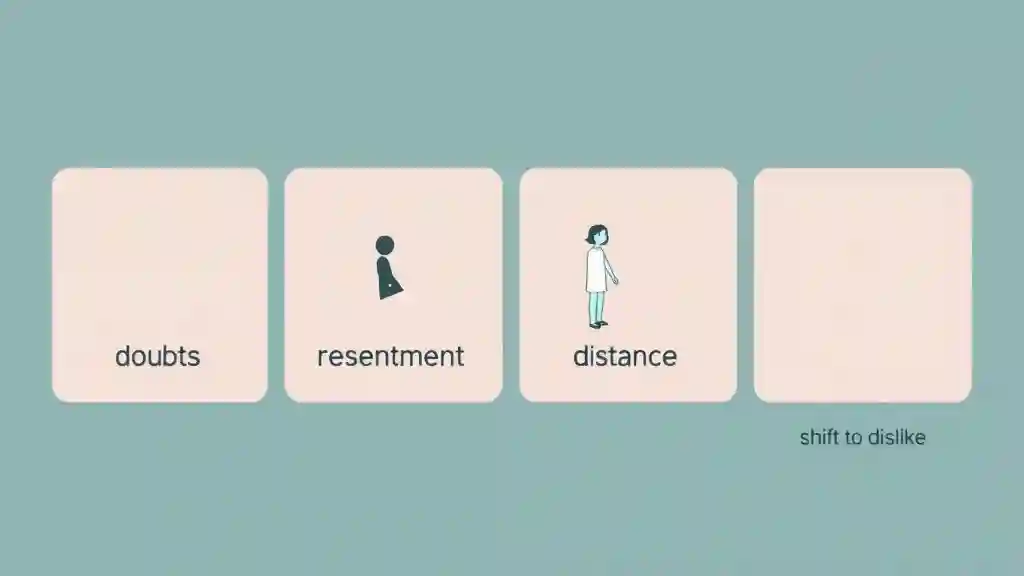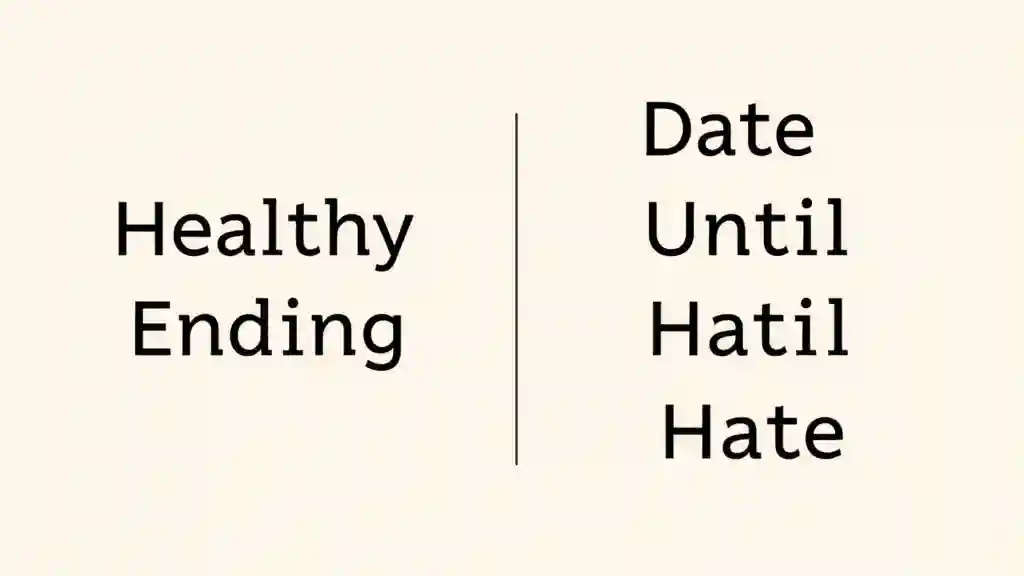
It’s 2025, and social media is inventing new ways to love—and new ways to break hearts.
One trend that’s been blowing up TikTok and Instagram reels is called the “Date Them Until You Hate Them” method.
The name itself sounds savage. At first glance, it feels like a punchline, the kind of advice your sarcastic best friend might give after one too many breakups. But here’s the twist—it’s not a joke. It’s a real dating strategy people are trying. And it’s shaking up the way we think about relationships.
So, what is it?
In simple words, instead of breaking up when things start to feel off, people keep dating until the love fades into dislike. They wait until resentment replaces affection. That way, when the breakup finally happens, it doesn’t hurt as much.
Sounds clever? Or cruel? Maybe both.
Why This Method Exists in the First Place
Most of us hate confrontation. Telling someone, “I don’t love you anymore,” feels like swallowing broken glass. It’s awkward, messy, and sometimes dangerous.
So the “Date Them Until You Hate Them” method sneaks around that pain. The logic is: if you let time and disappointment slowly kill the romance, you’ll eventually lose all attachment. You won’t cry as much, you won’t doubt yourself as much, and you might even feel relieved instead of devastated.
But there’s a dark side. While you’re waiting for love to rot, you’re still in the relationship. You’re still going through the motions, living together, sharing meals, even saying “I love you” while secretly counting the cracks. That’s where the emotional chaos starts.
The Feelings You Go Through

Let’s be real—dating someone until you hate them is not as clean as TikTok edits make it look.
It usually goes like this:
- Phase 1: Tiny doubts
You start noticing small things—how they chew, how they leave socks on the floor, how they scroll their phone during dinner. You brush it off. - Phase 2: Silent resentment
The little annoyances pile up. You don’t say anything. You hold it in. Your chest feels tight, but your mouth stays shut. - Phase 3: Emotional distance
Kisses feel like routine. Conversations are short. You laugh less. You scroll more. - Phase 4: The shift
One day, you catch yourself looking at them and feeling… annoyed. Maybe even disgusted. That’s when you realize: love has turned into dislike.
My Friend’s Experience

One of my closest friends, let’s call her Maya, tried this without even knowing the trend had a name.
She was dating a guy for two years. They weren’t fighting, but she kept feeling off. Instead of telling him, she decided to “wait it out.” She told me once,
“I thought if I stayed long enough, the love would dry up on its own. That way, leaving wouldn’t break me.”
And it did. Slowly, she started cringing at his texts, rolling her eyes at his jokes, and preferring silence over his company. By the time she finally left, she didn’t shed a single tear.
But here’s the catch—she carried guilt. For months, she wondered if she had wasted both their time by staying silent.
Why It Hurts (Even If It Seems Easy)
Dating until you hate someone might sound like self-protection, but emotionally, it’s a rollercoaster.
- You build insecurity. You start doubting if you’re a bad partner because you’re “faking” love.
- You feed resentment. Small annoyances turn into silent wars in your head.
- You feel shame. Because deep down, you know you’re avoiding the hard talk.
- You isolate yourself. Instead of opening up, you carry it alone.
A paradox happens: you’re still in a relationship, yet you feel completely alone. That loneliness eats at your confidence.
The Research Side
Recent psychology papers (2024–2025) have called this method a form of silent breakup. The American Psychological Association found that relationships built on “emotional neglect” often leave people with higher anxiety and lower self-esteem than clean, honest breakups.
Harvard researchers studying digital-age dating noticed that younger generations—especially Gen Z—prefer “low-drama exits.” Instead of loud fights or confrontations, they lean toward slow fades, ghosting, or methods like “date them until you hate them.”
But here’s the warning: while the breakup may sting less in the moment, the emotional toll can last longer. You don’t just leave the person—you leave with baggage.
My Mistake
I’ll be honest. I did this once without realizing it.
I dated someone in my twenties who was sweet, kind, and perfect on paper. But something inside me kept sinking. Instead of saying anything, I stayed. I thought maybe I’d “fall back in love.”
But every dinner felt like a chore. Every text felt heavy. I started imagining life without him—and those daydreams felt better than reality. By the time I left, I wasn’t sad. I was relieved.
Still, I look back with regret. I wish I had been brave enough to end things sooner. Maybe he wouldn’t have wasted months thinking we were fine.
Generational Differences
Here’s where it gets interesting.
Older generations (Boomers, Gen X) often valued tough conversations. Breakups were confrontational, messy, even dramatic. But at least things were said out loud.
Gen Z, raised online, is different. We’re used to swiping left, ghosting, soft-blocking. We like clean exits with minimal confrontation. The “Date Them Until You Hate Them” method fits perfectly into that mindset—it’s like ghosting, but in slow motion.
But silence doesn’t always equal peace. Sometimes it just means delayed pain.
What “Hate” Really Means Here

Let’s pause on the word hate.
In this context, it doesn’t mean rage or wishing harm. It’s more like emotional detachment. You don’t want to fight them—you just want them out of your space. It’s not fire, it’s ice.
This difference matters. Because if you hear “date until you hate” and think it’s about being cruel or vindictive, that’s not the point. The point is to numb yourself until leaving feels easier.
But numbing isn’t healing.
Recognizing If You’re Doing This (Unknowingly)
Here are some red flags that you might be “dating until you hate”:
- You stop sharing good news with your partner.
- Their habits annoy you more than they delight you.
- You fantasize about being single more than being with them.
- You avoid deep talks because you don’t want to “deal with it.”
- You catch yourself waiting for something to break so you can leave.
If you nodded to more than two of these, you might be slipping into this method without realizing it.
Facing It
Yes, it’s terrifying to look someone in the eye and say, “This isn’t working.” But honest communication is a kindness, even if it feels brutal.
There are healthier ways:
- Set boundaries early. Don’t wait until resentment builds.
- Use “I” statements. (“I feel disconnected” vs. “You never listen.”)
- Try journaling first. Writing your feelings down can make conversations clearer.
- Therapy apps. Digital therapy tools in 2025 make processing emotions easier than ever.
A Mini Checklist (For Self-Awareness)
Ask yourself weekly:
- Am I avoiding them more than seeking them?
- Do I feel lighter when they’re not around?
- Have I stopped imagining a future with them?
- Am I staying because leaving feels too hard, not because I want to?
If your answers lean yes, you owe yourself honesty.
The “Date Them Until You Hate Them” method may feel like a shield against heartbreak, but underneath, it’s a slow poison. It creates resentment, shame, and emotional distance.
I’ve seen it in my friends. I’ve lived it myself. And maybe you’re living it right now without even naming it.
Why People Fall Into This Trap
But why do people actually do this?
- Fear of confrontation. It feels safer to let feelings die naturally than to speak up.
- Hope it will fix itself. Some think staying longer might reignite the spark.
- Avoiding guilt. They’d rather blame “time” than admit they chose to walk away.
- Cultural habits. Gen Z’s “slow fade” style makes silence the norm.
The danger? While waiting for the dislike to grow, you waste months—or years—living in emotional neglect.
The Hidden Price Tag
This method doesn’t come free. It leaves scars you may not notice until much later.
- Loneliness inside the relationship.
You share space but not emotions. That silence weighs heavier than arguments. - Self-doubt.
You start asking, “Am I broken for not feeling love anymore?” - Built-up resentment.
Small annoyances snowball into bitterness. - Post-breakup guilt.
Once you leave, you wonder if you wasted both your time.
A Reader’s DM
“I stayed with my girlfriend until I couldn’t stand the sound of her voice. At first, it was comfort. Then, I couldn’t even sit next to her on the couch. When we finally broke up, I didn’t cry. But months later, the guilt crushed me. I realized I had let her love me while I had already checked out.”
That’s the paradox. You think you’re saving yourself pain. In reality, you’re just delaying it—and sometimes making it worse.
Recognizing the Signs You’re Stuck in a “Slow Fade Relationship”
Ask yourself these blunt questions:
- Do you daydream more about being single than being with your partner?
- Have your texts gotten shorter, colder, or delayed?
- Do you avoid deep talks because you’re scared they’ll force a decision?
- Do you notice more icks than sparks?
- Do you feel “relieved” when they cancel plans instead of disappointed?
If most of these feel true, you’re not just “busy.” You’re already in the Date Them Until You Hate Them cycle.

Healthy Alternatives to the Method
Instead of drifting into hate, you can end things with honesty. Here’s how:
1. The 3-Step Conversation Framework
- Step 1: Own your feelings. Use “I” statements: “I feel disconnected,” not “You make me miserable.”
- Step 2: Be clear but kind. Ambiguity drags things out. Say, “I don’t see a future,” not “Maybe later.”
- Step 3: Give closure. Respect their emotions by answering questions instead of running.
2. Journaling Before Talking
Sometimes your mind is in chaos. Writing your feelings for a week clears the fog so you don’t stumble through the talk.
3. Therapy & Support Apps
In 2025, therapy apps are huge. Even a few sessions can prepare you for the confrontation you’ve been avoiding.
A Mini-Checklist: When It’s Time to Walk Away
- ✔ You’ve lost emotional intimacy.
- ✔ You avoid physical touch out of obligation.
- ✔ You fantasize about a different life more than fixing this one.
- ✔ You’ve tried communicating but nothing changes.
If you checked these, dragging it out will only deepen the resentment.
Comparison: Healthy Breakup vs. Date Until Hate
| Healthy Ending | Date Until You Hate |
| Honest talk early | Silence until resentment builds |
| Mutual respect stays intact | Mutual resentment poisons memory |
| Faster healing time | Lingering guilt and self-doubt |
| Future friendship possible | Burned bridges, no closure |
Healing After You’ve Done This
Maybe you’ve already used this method. Maybe you’re reading this with a pit in your stomach. That’s okay. You can still heal.
Step 1: Forgive yourself
You weren’t evil. You were scared. That’s human.
Step 2: Reflect honestly
Ask: “Why did I avoid honesty? Fear of rejection? Fear of hurting them? Fear of being alone?”
Step 3: Reset your boundaries
Promise yourself: next time, you won’t wait until resentment grows. You’ll speak earlier, even if your voice shakes.
Step 4: Learn emotional skills
Read books, join support groups, or use therapy. The skill of healthy confrontation will save your next relationship.
A 7-Day Emotional Awareness Challenge
If you’re unsure whether you’re in a toxic slow fade, try this:
- Day 1: Journal how you felt around your partner today.
- Day 2: Note moments of joy vs. annoyance. Which list is longer?
- Day 3: Ask yourself: Did I avoid talking about something today?
- Day 4: Rate my closeness on a scale of 1–10.
- Day 5: Imagine life without them. Relief or sadness?
- Day 6: Track my texts: warm or cold?
- Day 7: Re-read the week. Is my love alive, or already fading?
This reflection can be brutal. But it clears denial faster than waiting for hate to do the work.
What NOT to Do
- ❌ Don’t wait for “the perfect time” to break up. It doesn’t exist.
- ❌ Don’t stay out of pity. That only deepens their pain later.
- ❌ Don’t suppress feelings, thinking hate will grow naturally. You’ll end up resenting yourself, too.
- ❌ Don’t ghost after months of silent neglect. That erases trust.
The Bigger Picture: Culture and the Future
The Date Them Until You Hate Them method reflects more than just dating—it shows how our culture avoids conflict. We’d rather swipe away, mute, or fade out than face discomfort.
But real growth demands discomfort. If we want healthier love, we need to unlearn silence.
The future of relationships isn’t about avoiding pain. It’s about building emotional resilience. If Gen Z can master that, we’ll stop repeating toxic cycles and finally give ourselves the love we deserve.
Interactive Prompts for You
- 🗳 Poll yourself: Have you ever “dated until you hated”? Yes / No / Maybe.
- 📝 Reflection: What emotions are you noticing growing or fading in your current relationship?
- 💬 Comment starter: Drop a 🚩 if you’ve felt yourself slowly disconnect in silence.
Conclusion
The Date Them Until You Hate Them method might feel like an escape hatch from heartbreak, but it’s really a slow bleed. You don’t just lose your partner—you lose pieces of yourself in the silence.
The healthier path? Face the hard talks. Name the truth. Choose courage over comfort.
Because love deserves clarity, not slow decay. And you deserve healing, not hidden resentment.
So if you’re stuck in a toxic slow fade relationship, take this as your sign: don’t wait for hate. End it with honesty. Start fresh with self-respect.
👉 Now your turn—have you ever been in this cycle? Share your story in the comments. Someone out there needs to hear they’re not alone.
Disclaimer: This post is for informational and emotional support purposes only. Every relationship is unique, and this is not professional legal, medical, or mental health advice. Read our full disclaimer.
Affiliate Disclosure: Some links in this post may be affiliate links. If you make a purchase through them, I may earn a small commission at no extra cost to you. Learn more here.
Pingback: Ghostlighting: ghosts then gaslights me 2025 - Love and Breakups